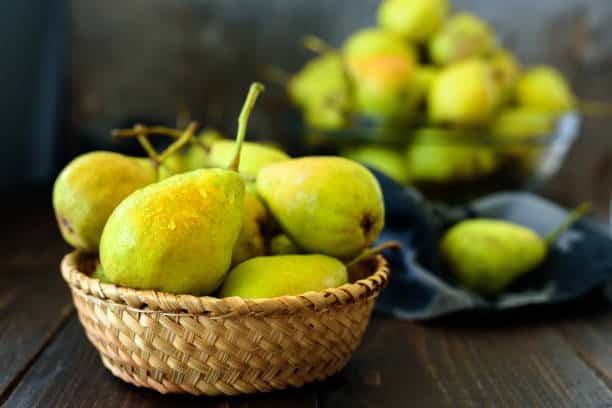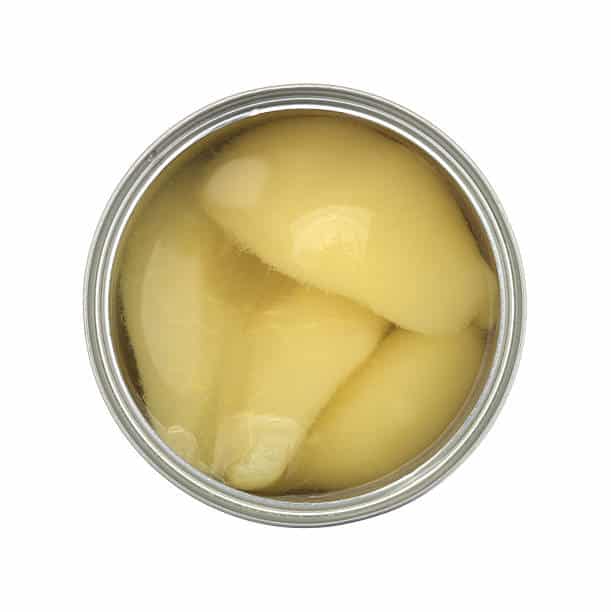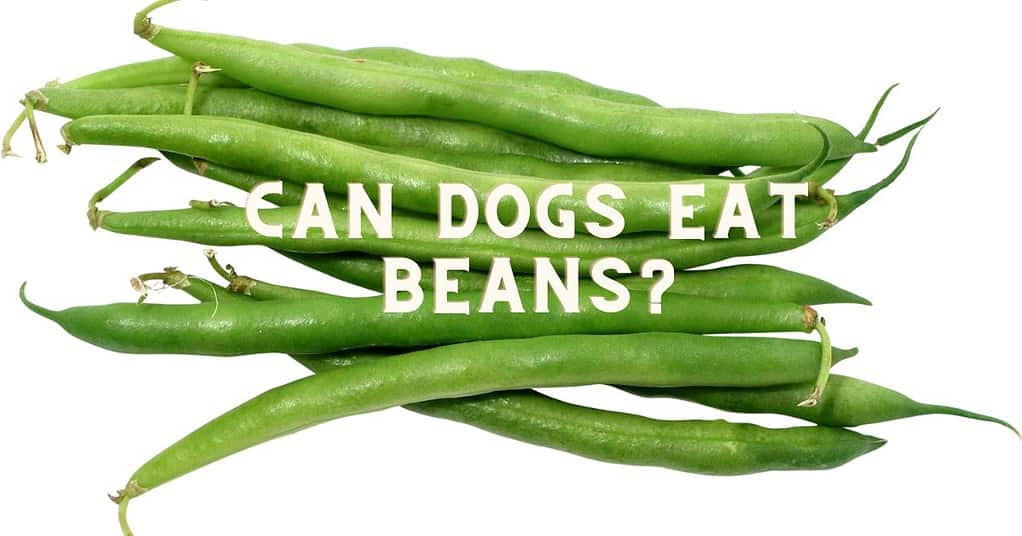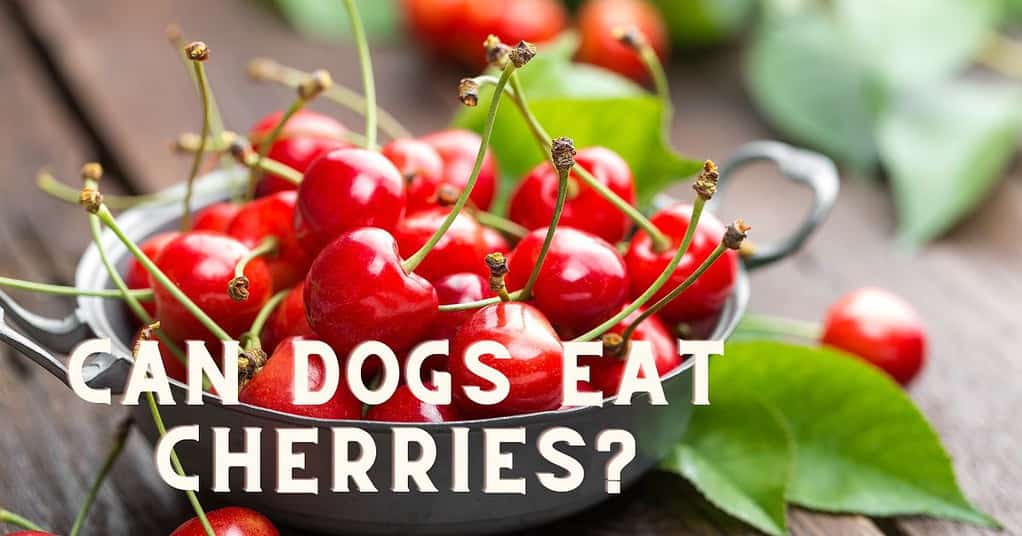Ever wondered if pears are a healthy snack for your dog? Not all fruits and veggies we humans enjoy are suitable for our pets. But can dogs eat pears?Filled with a ton of vitamin K, minerals, Vitamin C, and antioxidants, pears are great for dogs. However, this delicious, sweet fruit can be given only in moderation. Find out exactly what to remember when you give your dog pears.
Can Dogs Eat Pears?
Yes, dogs can indeed eat pears. While pears are not toxic to dogs, they should be served cautiously and in moderation. Dogs can benefit from the nutritional value of an appropriately served pear—rich in minerals like potassium and high fiber content for digestion.
Pears also offer antioxidant properties, a boon for your pet’s health. However, core and seeds need removal before serving as they could present choking hazards or release trace amounts of cyanide into their system if ingested.
Always cut the pear into small morsels to prevent choking and maintain dental health by not subjecting them to hard fruit pieces.

Can Dogs Eat Asian Pears?
Certainly, dogs can safely enjoy Asian pears as a part of their diet. These fruits pack a nutritional punch, with essential vitamins and minerals contributing to our canine companions’ overall wellness.
Notably, the high vitamin levels found in these pears can aid in boosting eye health for dogs. However, before serving this fruity treat, it’s critical to remember safety measures.
Remove the core and seeds of the Asian pear as they contain traces of cyanide—a compound that can cause cyanide poisoning.
Moreover, when feeding your dog this fresh fruit or any other human food item, moderation is key. Despite its health benefits, the controlled inclusion of Asian pear within your pet’s diet is crucial to maintaining their ideal weight and preventing issues like obesity or high blood sugar levels.
Can Dogs Eat Pears With Skin?
While pears are not toxic to dogs, you must remove the pear skin before feeding them this sweet treat. The pear’s skin can be tough for your furry friend and could cause a stomach upset or become a choking hazard.
Safer ways to serve pears involve peeling off the outer layer, ensuring your dog gets only the soft, easily digestible flesh. Fresh pears in moderation make an excellent addition to your pet’s diet offering fiber and essential minerals.

Can Dogs Eat Korean Pears?
Korean pears are safe for dogs to eat and can be a tasty treat. These juicy fruits containvitamins C and K, soluble fiber, and antioxidants. The high sugar content in Korean pears means they should be given sparingly as part of a balanced diet.
To safely feed Korean pears to your dog, remove the core and seeds before offering them a slice of pear. Dogs should not consume pear cores or seeds. Korean pears can pose a choking hazard and contain a compound called amygdalin that metabolizes into cyanide when ingested in large amounts.
Also, avoid giving your dog canned pears due to their added sugars.
Can Dogs Eat Pears Skin?
Removing the skin before feeding it to your furry friend is generally recommended. The skin of a pear can be tough for dogs to digest and may cause an upset stomach.
Also, pesticide residue might be present on the skin, potentially harming your dog if consumed in large quantities.
Can Dogs Eat Canned Pears?
Canned pears might seem convenient to share with your furry friend, but it’s best to avoid feeding them to dogs. These canned fruits often contain added sugars and preservatives, which can harm dogs.
The high sugar content can lead to weight gain and even dental issues. Some canned pears may contain spices or seasonings that could upset your dog’s stomach or cause other digestive problems.
To keep your pup safe and healthy, stick to fresh pieces of pears instead of the canned variety when sharing this tasty fruit with them.

Can Dogs Eat Apple Pears?
Apple pears, also known as Asian pears, are a type of fruit that dogs can enjoy in moderation. These pears have a crisp texture and sweet flavor that dogs may find appealing. Like other pears, apple pears provide some health benefits for dogs.
They are a good source of vitamins and minerals, including vitamin C and potassium. Too much sugar can harm dogs, so apple pears should only be given as an occasional treat.
Can Dogs Have Pears To Eat?
While dogs are primarily carnivorous, fruits like pears can be a healthy meal addition. Pears are not toxic to dogs and can provide them with essential nutrients such as vitamins C and K and fiber.
Feeding your dog too many pears can lead to an imbalance in their diet or cause gastrointestinal upset. Veterinarians recommend treating fruits like pears as occasional snacks rather than a staple food for your furry friend.
Treats should only comprise around 10% of your dog’s daily food intake.
The Health Benefits Of Pears For Dogs
Pears offer numerous health benefits for dogs, including providing essential nutrients, aiding digestion, and offering antioxidant properties.
Nutritional Value
Pears are not only a tasty treat for dogs, but they also offer a range of nutritional benefits. Packed with vitamins and fiber, pears can improve your dog’s overall well-being.
They contain minerals like potassium, copper, zeaxanthin, and anthocyanins lutein that promote eye health and support the immune system.
Plus, the natural sugars found in pears are released slowly into the bloodstream, which makes them suitable for dogs with diabetes. With their fiber content, pears also aid digestion by feeding the good bacteria in your dog’s gut.
Digestive Benefits
Pears offer digestive benefits for dogs that help keep their tummies happy and healthy. With their high fiber content, pears contribute to good digestion by promoting regular bowel movements and preventing constipation.
The fiber in pears also acts as a prebiotic, feeding the beneficial bacteria in your dog’s gut and supporting a healthy gut microbiome. This is great for dogs with sensitive stomachs or those prone to gastrointestinal issues.

Antioxidant Properties
Pears also offer antioxidant properties. Antioxidants help protect the body’s cells from damage caused by harmful molecules called free radicals.
Pears contain compounds like zeaxanthin and anthocyanins lutein, potent antioxidants that promote overall health in dogs. These antioxidants enhance eye health and reduce the risk of age-related diseases.
Potential Risks Of Dogs Consuming Pears
Feeding dogs pears can pose potential risks, including the danger of choking on pear cores and seeds and digestive issues such as gastrointestinal upset.
Cores And Seeds
Removing the cores and seeds from pears before feeding them to your dog is crucial. The core of the pear can be a choking hazard for dogs. If swallowed whole, it may cause a foreign body obstruction in the digestive system.
Large pear cores pose a higher risk compared to smaller ones. The seeds contain amygdalin, a chemical compound that releases cyanide when ingested.
Although the amount of cyanide in pear seeds is generally small and unlikely to cause harm in small quantities, it’s best to err on the side of caution.
Canned Pears And Added Sugar
Canned pears are not good for dogs. Dogs have different nutritional needs than humans, and excessive sugar can lead to gastrointestinal upset and even obesity in dogs.
The added sugars found in canned pears can have negative health effects. Resh pears have a lower sugar content and are safer for overall well-being.
Always read ingredient labels carefully to avoid hidden sugars harming your pet.
Spices Or Seasoning
Using spices or seasoning when feeding pears to dogs is not recommended. These additives can be harmful and cause gastrointestinal upset in dogs. Serve pears cooked without any spices or seasoning.
Risk For Dogs With Pre-existing Health Issues (Obesity, Diabetes)
Dogs with pre-existing health issues, such as obesity and diabetes, are at a higher risk when consuming pears. While pears can be a healthy addition to a dog’s diet in moderation, the sugar content in pears can pose challenges for dogs with diabetes.
Pet owners must closely monitor their dog’s sugar intake and consult their veterinarian before introducing new treats or fruits into their diet.
For overweight dogs, maintaining a strictly controlled diet is crucial. Any additions to their food, including fruits like pears, should be approved by a veterinarian.
Dogs with stomach issues should also avoid pears due to their high sugar content.

Alternate Fruits And Veggies For Dogs Who Love Pears
Apples:
Dogs can enjoy apples, as they are packed with vitamins and fiber. Just remember to remove the core and seeds before feeding them.
Blueberries:
These bite-sized fruits are a great source of antioxidants for dogs. They can be served fresh or frozen, making them a perfect summer treat.
Pumpkin:
Not only is pumpkin nutritious for dogs, but it can also aid in digestion. Make sure to use plain, canned pumpkin without added spices or sugars.
Carrots:
Crunchy and low in calories, carrots are an excellent dog snack. They are rich in vitamins and promote good dental health.
Watermelon:
This hydrating fruit is safe for dogs to enjoy in small amounts. Remove the seeds and ensure that your dog doesn’t consume the rind.
Bananas:
High in potassium and fiber, bananas make a healthy treat for dogs. However, they should be fed moderately due to their high sugar content.
Broccoli:
This cruciferous vegetable offers several health benefits to dogs, including vitamins A and C. Steam or lightly cook it before serving to enhance digestibility.
Celery:
Its high water content and crunchy texture make it a refreshing snack for dogs. It also provides essential vitamins like K and C.
Spinach:
Packed with iron and other nutrients, spinach can benefit your furry friend when cooked or steamed. Avoid feeding large quantities due to its oxalate content.
Strawberries:
These sweet treats are loaded with vitamin C and antioxidants. Feed them to your dogs in moderation as occasional treats.
Peas:
Whether fresh or frozen, peas are a great source of vitamins B6, C, and K. They can be served as a side dish or mixed into your dog’s meal.
Sweet Potatoes:
Rich in dietary fiber and beta-carotene, sweet potatoes provide numerous health benefits to dogs. Bake or steam them before serving.
Cucumbers:
Cucumbers are a cool dog treat, low in calories and high in hydration. They can be sliced into bite-sized pieces for easy snacking.
Consultation With Your Vet For Dogs With Pre-Existing Conditions
If your dog has any pre-existing health conditions, consult your veterinarian before introducing pears or new treats into their diet.
Here are some common pre-existing conditions that may require consultation:
1. Obesity:
Dogs who struggle with weight management may need careful monitoring of their calorie intake, including treats like pears. Your vet can guide you on portion control and whether pears suit your overweight pet.
2. Diabetes:
Pears contain natural sugars, so dogs with diabetes may need to limit or avoid them altogether. Your vet can help determine if incorporating small amounts of pear into a diabetic dog’s diet is safe.
3. Gastrointestinal issues:
Some dogs have sensitive stomachs or digestive disorders that might aggravate certain foods, including pears. Consulting with your vet will ensure feeding pears won’t cause gastrointestinal upset.
4. Allergies:
If your dog has known food allergies, it’s essential to check if they are allergic to pears before offering them as a treat. Your vet can conduct allergy tests or recommend an elimination diet to identify potential allergens.
5. Dental problems:
Dogs suffering from dental issues such as tooth decay, gum disease, or missing teeth might find it difficult to chew hard fruits like pears comfortably. A vet can suggest alternative ways to incorporate the nutritional benefits of pears without compromising oral health.
6. Medications:
Certain medications may interact negatively with fruits like pears due to the compounds present in them. Always consult your vet regarding potential drug interactions before offering fruits as treats alongside medication regimens.
7. Previously diagnosed illnesses/conditions /underlying diseases:
Dogs with underlying health concerns such as liver disease or kidney problems may require a restricted diet that could limit fruit consumption. Too much can even impact heart health.
Conclusion
In conclusion, dogs can safely enjoy pears as delicious fruit. However, it is important to serve them in moderation and without the core or seeds. Fresh pears are the best option, while canned pears should be avoided due to their added sugar content.
FAQs
Is it safe for dogs to eat pears?
Yes, ripe pears in moderation are safe to eat. However, removing the seeds and core before feeding them to your dog is important.
Are there any health benefits of feeding pears to my dog?
Yes, pears are a good source of vitamin C and K and fiber. They can support your dog’s digestive health and immune system when fed appropriately.
Can feeding pears cause any digestive issues in dogs?
Feeding too many pears or giving them unripe pears can cause digestive issues in dogs, such as diarrhea or stomach upset. It is best to introduce pears gradually and avoid unripe pears at all costs.
How should I prepare the pear before feeding it to my dog?
Before giving a pear to your dog, wash it thoroughly and remove the core, seeds, and stem, as these parts can be choking hazards or contain toxins harmful to dogs. You can slice or dice the pear into small pieces for easier consumption by your furry friend.
Author Profile
- Site Owner And Planning Specialist
-
Aritra, the founder of Labradorandyou.com, is a lifelong dog lover whose passion ignited for Labradors for their loyalty and intelligence. With extensive research and personal experiences, Aritra has become a Labrador expert, offering a rich resource on the breed. Labradorandyou.com provides reliable, timely, and evidence-based information, including Labrador-specific product reviews, training techniques, and care tips.
Labradorandyou.com was born out of Aritra's passion and his desire to share his profound knowledge about the breed. The site serves as a comprehensive resource, offering a wealth of up-to-date information for Labrador owners and enthusiasts alike
Also by the author
-
 FAQNovember 17, 2023How To Adopt An Emotional Support Dog?
FAQNovember 17, 2023How To Adopt An Emotional Support Dog?
-
 Mix-BreedsNovember 16, 2023Red Labradoodle Ultimate Guide: Breed Facts, Care Tips
Mix-BreedsNovember 16, 2023Red Labradoodle Ultimate Guide: Breed Facts, Care Tips
-
 Top BreedersNovember 8, 2023Breeding Labradors: Everything You Need to Know
Top BreedersNovember 8, 2023Breeding Labradors: Everything You Need to Know
-
 FAQOctober 17, 2023Do Dogs Like Music? Researchers Say Yes! Find Out
FAQOctober 17, 2023Do Dogs Like Music? Researchers Say Yes! Find Out





